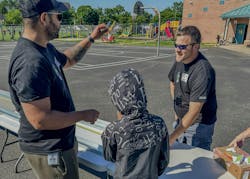Fourth-grade students race solar cars for STEM
Fourth graders at Foose Elementary School in Harrisburg, Pennsylvania raced solar cars as the finale of the 2023-24 Think BIG program, a science, technology, engineering and math (STEM) curriculum developed by Phoenix Contact engineers.
Each month, from November through May, Phoenix Contact employees volunteered in the classroom to teach hands-on science lessons. The curriculum uses engineering methods to solve problems in the context of clean energy. Over the course of the year, the students learned about wind power and solar energy as they designed and built windmills and the solar cars they raced.
“Building the solar cars was a new addition to the curriculum this year, and they are a fun way to show the students the power of the sun,” said Patricia Marrero, vice president of organizational development and talent acquisition at Phoenix Contact. “The students, teachers, and Phoenix Contact employees always have a great time during the Think BIG lessons, and we’re excited that even more students will get to participate in the program during the 2024-25 school year.”
Phoenix Contact developed the Think BIG program in 2017 in partnership with Foose Elementary. In October 2023, Phoenix Contact announced an expansion of the program through the Capital Area Intermediate Unit (CAIU) 15. CAIU will use a $565,000 donation from Phoenix Contact to formalize and expand the curriculum to an additional 15 to 20 schools in Central Pennsylvania.

